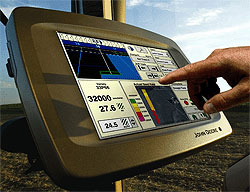 The pressure is on in the farming industry. At least, that’s what the English think. The Engineer Online reports that Prof John Beddington, the English government’s new chief scientific adviser, has claimed that an “impending food crisis is the biggest challenge facing humanity.” And, as it turns out, The Engineer Online says experts agree that precision farming is a major player in combating this “impending crisis.” That’s not all. They’ve highlighted John Deere‘s new ITEC Pro system as THE example of the technology needed to face the food crisis.
The pressure is on in the farming industry. At least, that’s what the English think. The Engineer Online reports that Prof John Beddington, the English government’s new chief scientific adviser, has claimed that an “impending food crisis is the biggest challenge facing humanity.” And, as it turns out, The Engineer Online says experts agree that precision farming is a major player in combating this “impending crisis.” That’s not all. They’ve highlighted John Deere‘s new ITEC Pro system as THE example of the technology needed to face the food crisis.
One of the most promising developments is the emerging area of precision farming, where GPS-guided agricultural machines, armed with a detailed knowledge of a field’s varying characteristics, place seeds, fertilisers and nutrients where they are needed most…
Although the idea is not new, agribusiness consultant Neil Cameron believes precision farming is finally coming of age. ‘People have been playing around with it for years, but in the last 18 months we’ve hit a place where the equipment’s got cheaper, and the accuracy has got better and better.’
While this has much to do with the ever-improving resolution of satellite systems, one of the main reasons the approach now holds such promise is the advanced performance of today’s agricultural machines.
 Today’s tractors, mainly GPS-guided and able to steer themselves, and combines have relegated the driver to the role of passenger. And there is more to come.
Today’s tractors, mainly GPS-guided and able to steer themselves, and combines have relegated the driver to the role of passenger. And there is more to come.
Earlier this year, agricultural machinery giant John Deere took the technology a step further with the launch of iTEC pro, a system that automates not only the steering, but also all of a tractor’s operations. ‘Pretty much from the moment you enter the field and set to work the operator is just a passenger,’ said Mark James, the company’s product manager for agricultural management solutions…
However, the prospect of armies of driverless robots toiling in the fields while the farmer sits at a desk at home is remote, said James. Not only would fears of 300hp combine harvesters hurtling out of control halt such plans, but there is always likely to be a need for on-site human expertise. The real benefit of automation, he said, is that it enables more efficient use of the driver’s expertise by freeing him from having to drive in a straight line for hours.
James added that while humans might not be completely removed from the loop, we may soon see operators driving one machine while a succession of driverless vehicles follow on behind. ‘On a multi-pass operation like planting potatoes — when there’s three or four operations — one man could potentially do this on his own but with a succession of different machines. Then you’ve got the experience in the operation, rather than expecting an automated system to make all the decisions.’
Click here to view the full article.
